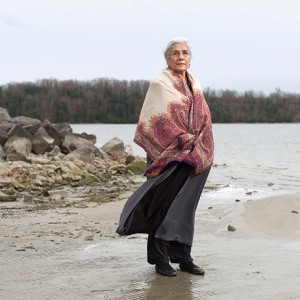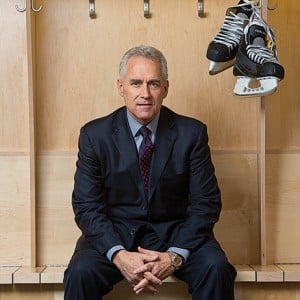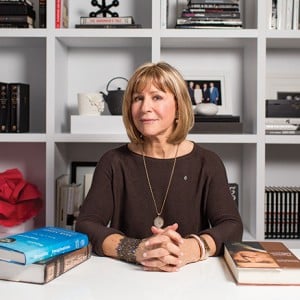Video: Four Power List honourees muse on the meaning of power
Four more Canadians unveiled in the continued reveal of our 2014 Power List tell us what power means to them
President and CEO of Hockey Canada, Tom Renney pictured in Calgary Alberta, November 14, 2014. Jason Franson for Maclean’s Magazine
Share
Alia Hogben, Marianne McKenna, Tom Renney and Heather Reisman all made it onto the 2014 Maclean’s Power List, which we’re continuing to rollout slowly over the course of the week—checking in at 24th, 25th, 26th and 34th, respectively. Here’s their thoughts on power, and what superpower they would have, if they could choose one.
#24. Alia Hogben
 |
When Alia Hogben took over the Canadian Council of Muslim Women a decade ago as the group’s executive director, few could have predicted the long-time bureaucrat from Ontario’s ministry of community and social services would emerge as one of the most compelling liberal voices of Islam in Canada. Her moderate Muslim perspective is indispensable. As a 2012 Order of Canada recipient, awarded for her work on women’s rights and promotion of interfaith dialogue, she is only the second female Canadian Muslim to receive that honour. She also has an honorary doctorate from Queen’s University and a column in the Kingston Whig-Standard, where she’s written how she was discouraged that many people, such as members of Islamic State, use religion as justification for unspeakable crimes. Recently, Hogben told the Canadian Press she’s disheartened that Stephen Harper did not denounce the anti-Muslim backlash in the aftermath of the Ottawa shooting. But Hogben is not one to point fingers. Rather, she champions Islam’s message of inclusivity. — Aaron Hutchins
#25. Marianne McKenna
In the era of “starchitects”—whose sculptural showpieces often stand defiantly apart from what’s around them—her buildings can seem understated. Marianne McKenna’s celebrated Royal Conservatory Telus Centre for Performance and Learning in Toronto, for instance, elegantly combines heritage buildings and warm new spaces. It’s pure harmony. Born in Montreal, McKenna is a founding partner of architecture firm KPMB. “We’ve been embraced as a team,” she has said of the close-knit Toronto office’s influence. KPMB’s landmarks in their home city include the recent expansion of University of Toronto’s Rotman School of Management, which McKenna directed. But her reach is international. Current McKenna ventures include the Massachusetts Institute for Technology’s Music and Theater Arts Project in Walker Memorial Hall and an expansion of Orchestra Hall in Minneapolis. — John Geddes
#26. Tom Renney
 |
Long counted as one of the more progressive minds in hockey, Tom Renney is now steward of Canada’s game at its grassroots level. The well-travelled NHL coach—Renney saw head-coaching stints with Vancouver, Edmonton and the New York Rangers—was named president and CEO of Hockey Canada in July, beating out what board members described as an outstanding field of candidates.
The 59-year-old’s reputation as a conciliator and communicator will serve him well as he seeks consensus among Hockey Canada’s 13 regional branches representing 635,000 players. And there’ll be no shortage of controversy to test his judgment. The governing body is grappling with issues ranging from body-checking to concussions to the negative influence of overbearing parents. It has also grown more commercial, merchandising its maple-leaf logo, aggressively marketing its marquee tournaments and doing its utmost to capitalize on Olympic hype. Fortunately, Renney, who hails from Cranbrook, B.C., has a coldly practical side, as well as a passion for the game. Coaching in the Big Apple will teach you that. — Charlie Gillis
#33: Heather Reisman
 |
The chief executive officer and owner of a chain that moves almost half the books sold in Canada will always have literary opinions of significance to the entire book trade. But Heather Reisman, 66, is no aloof, profit-focused CEO. Indigo’s self-described “chief book lover” is the very face of her company and a voracious, wide-ranging reader: “Novels, poetry, biography, business stories, all kinds of books,” she says. Her intense personal interest means Reisman’s take matters like no one else’s, right down to individual titles. More than anyone else in the country, Reisman can make a bestseller, says one publishing industry observer, “as she did with Lawrence Hill’s Book of Negroes through her enthusiastic early adoption in her Heather’s Picks and in-store interviews.” Meaning, of course, that her silence can also be deadly.
For everyone in the book trade who snarks over the increasing space in Indigo stores devoted to candles, yoga mats and dinnerware, there is an admirer to praise Reisman’s business acumen—and what that’s meant to books in Canada. “If bookshops are still alive here—hers particularly, but also others that have learned from her,” says the publishing executive, “it’s because she was one of the first anywhere to bring in other items to support the core business. Now she’s an international trendsetter in that area.”
The effort to keep her chain flourishing isn’t just a labour of love, says Reisman, who with husband Gerry Schwartz, 72, the billionaire owner of Onex Corp., forms one of Canada’s more formidable power couples. “I totally think the book business has a future. Physical books will be with us for a long time to come—there’s something about their physicality—and Canadians’ commitment to reading will only grow. That’s just who we are.” — Brian Bethune